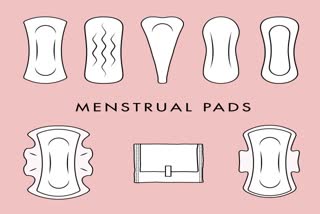The most common product used during menstruation by women and girls is sanitary napkins, commonly referred to as pads. Those are considered to be more hygienic than cotton clothes, used by many females, especially in the rural areas. However, sometimes sanitary pads can also cause discomfort, irritation, and infection in the genital area.
How Do Sanitary Napkins Harm?
Dr. Prachi explains that fungal infections and other types of skin and vaginal infections can be seen in a large number of women due to the use of sanitary napkins. The main reason behind this is that many girls and women use the same pad for a much longer duration than it should be used. In such a situation, the area surrounding the vagina becomes moist due to bleeding and perspiration, which leads to a large number of females suffering from an infection, itching, rashes, and irritation during this time.
Apart from this, sometimes the topmost layer of the pad can also damage the skin of the area down there. Dr. Prachi explains that there are various types of chemicals used in the production of sanitary napkins, in order to make them more absorbent and less stinky or odor-free. Females who have sensitive skin and who use these napkins are likely to develop rashes, pimples, or infections on the skin.
A chemical called Dioxin is commonly used while making sanitary pads, to bleach them. This dioxin is a harmful chemical and it can cause many problems. Also, in many pads, deodorants or neutralizers are used to control the odor during menstruation. But, a risk associated with scented pads is that they can negatively affect your fertility. As a result of all these factors, apart from itching and burning sensation in the skin, using such pads can also increase the risk of vaginal yeast and other infections.
What Are The Alternatives Of Sanitary Pads?
Our expert says that it is very important that girls and women be very cautious regarding hygiene and cleanliness during menstruation. Usually, most of the problems can be solved to a great extent by changing the pads at regular intervals and maintaining proper hygiene. However, if they experience pain, burning, itching, and rashes in the skin of the genital area, during or after menstruation, then instead of the synthetic coated pads, pads made out of cotton or cotton fabric can be used. You can also go for menstrual cups or tampons, which are easily available in the market these days.
Dr. Prachi explains that although the use of tampons reduces the risk of infection to a certain extent as compared to pads, it may not prevent the risk of infection completely. In urban areas, especially in metro cities, a large number of women have switched over to menstrual cups. The main reason is that they are easy to use. As they can be reused, one does not need to buy them every month, which makes them economical. Furthermore, as it does not touch the other or the skin surrounding the vagina, the risk of infection is a lot less. Also, it reduces a lot of waste, which makes them environment-friendly.
Also Read:How COVID-19 Impacted Menstrual Hygiene In India's Rural And Semi-Urban Regions
Things To Remember While Using Sanitary Napkins, Tampons,Or Menstrual Cups
Dr. Prachi says that no matter what you use during menstruation, there are some important things that females need to keep in mind.
- Females using sanitary napkins or tampons should change it after every four hours.
- Wash your hands thoroughly with soap and water before and after using a sanitary napkin, tampon, or menstrual cup.
- Keep at least two menstrual cups handy, so that when one cup is full, another one can be used. Menstrual cups should be used only after thoroughly washing them before use and boiling them in hot water to sterilize.
- Before switching to menstrual cups or tampons, be well informed about how to use them, the selection of the size, and precautions one should take while using them.
- During menstruation, do not wear tight clothes, to ensure proper air circulation and that moisture does not develop in that area.
- As far as possible, try to keep the genital area dry
- Drink a lot of water and keep yourself well hydrated to prevent UTI infectionsduring menstruation.
- Wear clean and washed underwear every day. When you wash it, dry it in the sun so that there is no moisture in it.
This way, you can have happy and irritation-free periods. Whatever menstrual product you use, know everything about it. If you are planning to switch to other options than sanitary pads, like tampons or menstrual cups, read well about them. You can also consult a gynecologist to understand more about it and get an expert opinion.
